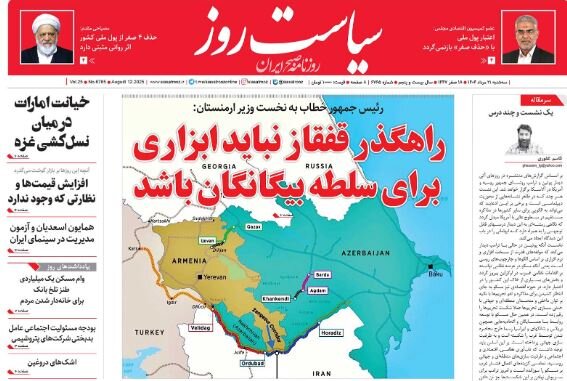Looming Putin-Trump meeting on Ukraine war and a few lessons

TEHRAN - Siasat-e-Rooz dedicated its editorial to the upcoming meeting between Vladimir Putin of Russia and Donald Trump of the United States, set to take place in Alaska, focusing on its implications for the Ukraine war.
The editorial argues that Europe's exclusion from this meeting underscores the diminishing relevance of the European Union and the European troika in global affairs. It suggests that Europe has effectively lost its authority and cannot initiate or uphold any commitments without U.S. approval. In this context, the editorial claims that negotiating with Europe over mechanisms such as the snapback provision is futile, as Europe lacks the autonomy to make or revoke decisions independently. The Putin-Trump meeting, it argues, not only highlights the importance of strength over diplomacy but also exposes the unreliability of the United States and the global impotence of the European Union. Consequently, the editorial concludes that Iran’s best course of action is twofold: first, to strengthen itself across all sectors by relying on domestic capabilities and strategic global allies; and second, to abandon negotiations with both the United States and Europe, as past experiences have shown that such talks yield no meaningful results.
Ettelaat: Iran at a critical juncture
Ettelaat spoke with Hassan Beheshtipour, an international affairs analyst, about possible resumption of nuclear negotiations between Iran and the United States. He said: An important issue that both Iran and the United States are well aware of the need for dialogue, but neither Tehran is willing to back down from its position nor Washington. Therefore, the possibility of reaching a common point seems unlikely and out of reach. This point should also be taken seriously. The Americans are seeking that Iran, in addition to the nuclear issue, should also engage in an exchange of views on its missile program, regional issues, and human rights issues, which are considered Iran's red line. Iran is at a critical juncture. The shadow of war hangs over us, and the Europeans are very seriously and intensely pushing to activate the snapback mechanism (that would return the United National sanctions lifted under the 2015 nuclear deal against Iran). Accordingly, we should avoid extremism and emotional decisions and have a realistic approach toward the facts on the ground, and as a result, we should consider expert decisions.
Khorasan: Iran lagging behind in the corridor competition
In a recent analysis, Khorasan examined the Zangezur agreement between Azerbaijan and Armenia, brokered by the United States. The editorial highlights that this corridor has carved out a new strategic highway through the heart of the South Caucasus. However, it argues that Iran has fallen behind in the regional power dynamics due to delays in developing its own internal transit corridors.
Economic expert Taher Rahimi has proposed at least four key measures to mitigate the negative impact of the Zangezur corridor:
• Initiating a gas swap with Russia via Turkmenistan instead of Azerbaijan
• Finalizing the Neka–Jask oil corridor in cooperation with Russia
• Making the North–South corridor independent of Azerbaijani territory
• Establishing a regional food hub in partnership with Russia
The editorial emphasizes that the Zangezur corridor represents a rapid and inevitable reshaping of regional geopolitics. It warns that if Iran fails to define its strategic role today, it risks becoming isolated—reduced to a map of borders with no meaningful links to the region’s economic lifelines.
Ultimately, the future of corridor diplomacy in the Caucasus and beyond demands a proactive, strategic, and multilateral approach—one that can elevate Iran from a passive bystander to a central player in regional influence.
Javan: Iran will not back down from its red lines
In an interview with international relations expert Dariush Safarnejad, Javan discussed Iran’s stance on the Zangezur corridor. Safarnejad emphasized that Iran must adopt a firm position to safeguard its geopolitical interests, in alignment with the strategic vision of the Leader of the Revolution. He noted that Iran's initial recognition of Armenia was based on the country’s existing borders as a neighboring state. Should there be any change in these borders, Iran would be legally entitled—under international law—to reconsider its recognition of both Armenia and Azerbaijan. Safarnejad warned against any shifts in regional borders facilitated by NATO intervention, asserting that such a development would represent a direct intrusion by the United States, the United Kingdom, and Israel into a region that lies at the heart of Iran’s national security interests. In response, he argued that Iran has every right to firmly assert its red lines, express opposition to the proposed corridor under NATO influence, and re-evaluate its diplomatic relations with Armenia if such developments threaten its sovereignty. Additionally, he stressed that Iran should be prepared to react decisively to any military or security presence by external parties in the region.
Leave a Comment